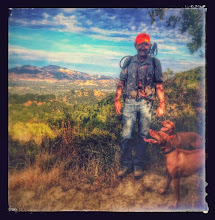I don't know if there is a "Wanderlust gene" or not, but ever since I was a very young boy, the desire to hike in the hills and explore creeks and canyons has always had a strong pull on me.
For thirty plus years, other responsibilites and activities took up my free time. Now owning Vizslas that REALLY enjoy the outdoors, I have refound my wanderlust.
It has become overpowering.
These days, I can't wait to get out on a trail and enjoy nature as the dogs explore everything.
Wanderlust: is a strong desire for or impulse to wander or travel and explore the world.
For thirty plus years, other responsibilites and activities took up my free time. Now owning Vizslas that REALLY enjoy the outdoors, I have refound my wanderlust.
It has become overpowering.
These days, I can't wait to get out on a trail and enjoy nature as the dogs explore everything.
Wanderlust: is a strong desire for or impulse to wander or travel and explore the world.
Etymology: The loanword from German language became an English term in 1902 as a reflection of what was then seen as a characteristically German predilection for wandering that may be traced back to German Romanticism and the German system of apprenticeship. The term has since become obsolete in German language.
A contemporary German equivalent for the English word wanderlust, in the sense of "crave for travel", is Fernweh (literally meaning "an ache for distance"). Since the term is a noun, its initial letter is always capitalized in German language ("Wanderlust"), but is written in lower case in English language ("wanderlust").
The term originates from the German words wandern (to hike) and Lust (desire). The term wandern, does in fact not mean "to wander", but "to hike." Placing the two words together, translated: "to enjoy hiking", although it is commonly described as an enjoyment of strolling or wandering.
Happy trails with happy Vizslas.












No comments:
Post a Comment